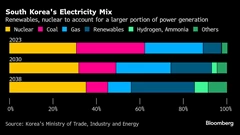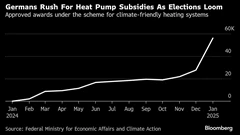Biden Embraces Oil as Ukraine War Overwhelms His Climate Agenda
(Bloomberg) -- President Joe Biden delivered his strongest endorsement of oil on Thursday, ordering an unprecedented release of emergency U.S. crude in a move that gambled his climate-saving credentials on lowering gasoline prices in an election year.
If the strategy works, Biden may help stave off both a recession and crushing defeats for his party in midterm elections, while drawing the ire of climate activists and potentially derailing his green goals. If it fails -- and it very well might -- he risks looking like Jimmy Carter, snubbed by oil-rich Mideast nations and powerless to rein in prices at the pump.
It’s a remarkable shift for a president who campaigned on promises to combat climate change, accelerate renewable fuels and block drilling permits on public lands and waters. In the space of a week, he’s instead ordered the emergency release of 180 million barrels of crude from U.S. stockpiles and presided over a plan to boost exports of American natural gas to Europe.

Biden’s aides insist his move to address an acute economic problem -- high gasoline prices -- doesn’t jeopardize his longer-term renewable energy and climate ambitions, but analysts and climate advocates saw an obvious contradiction.
“President Biden, who campaigned and won on an ambitious climate platform, may be on track to generate a bigger carbon footprint from the combustion of government strategic oil than all previous presidents combined,” said Kevin Book, managing director of ClearView Energy Partners.
The president was careful to cast his move as a bid to relieve consumers, and peppered his remarks with criticism of the domestic petroleum industry, which the White House says hasn’t moved quickly enough to increase production.
Biden implored oil companies to rebuff Wall Street’s demands for record profits and instead fulfill their “obligation” to boost crude production. And he excoriated firms that aren’t increasing output and proposed hitting the industry with penalties for letting federal drilling rights stay idle.
Underscoring the action Thursday is a harsh political reality: Biden can’t achieve his climate ambitions if Democrats lose control of Congress in the November elections or the U.S. is plunged into a deep recession.
Biden is trying to avoid “an economic catastrophe,” said Sarah Ladislaw, managing director at RMI, a nonprofit group focused on the clean energy transition.
“If the global economy hits a recession, our climate goals are going to get slowed down by a lot,” Ladislaw said. It’s difficult to build “additional support for clean energy when everyone’s worried about getting the economy back on track.”
Brian Deese, director of the White House National Economic Council, said the president’s record release of oil from U.S. reserves doesn’t mean he’s abandoning his climate goals. He described the plan as aimed at solving an acute economic problem -- high gasoline prices -- while the country moves toward ending its use of fossil fuels.

“The circumstances in global oil markets today and global energy markets today provide the clearest possible signal why the United States needs to do everything it can to accelerate toward true energy security and true energy independence,” he said at a White House briefing. “And the only way that we can ultimately do that is to reduce and eliminate our dependence on fossil fuels.”
But in the “very near term,” he said, “making sure that we have adequate supply is critically important for American families who are suffering.”
There’s an important political calculus. Polls indicate Democrats are poised for defeat in November’s midterm elections, potentially costing them control of one or both chambers of Congress. But Biden has struggled to hit on a solution for his party’s biggest headwind: persistent high inflation.
“I want to ease the pain that Americans are feeling right now,” Biden said Thursday, in a speech that demonstrated his awkward embrace of the U.S. oil industry in a time of war.
Climate Goals
In a nod to his climate goals, the president issued a directive intended to increase domestic production of the battery materials that are critical to powering electric vehicles and the clean energy transition. He insisted that current oil and gas moves will enable long-term shifts in the energy system.
“The bottom line is this: Between ramping up production in the short term and driving down demand in the long term, we can free ourselves from dependence on imported oil from across the world,” Biden said.
Only about 42% of Americans approve of the job Biden’s doing, compared with 54% who disapprove, according to Gallup’s latest survey. The gap is smaller than it was at the start of the year, but well below the net-positive approval the Biden administration enjoyed a year ago.
And a Quinnipiac University poll released this week found that 41% of Americans blame Biden’s policies for high gas prices, compared to 24% who blame the Russian invasion of Ukraine and another 24% who blame big oil companies.
Biden has tried to pin the blame squarely on Moscow, describing higher gasoline prices since the start of the year as “Putin’s price hike” in his speech on Thursday.
Even if the public believes he didn’t create the problems, “they do believe that he’s failed to solve it,” pollster Frank Luntz told Bloomberg Television’s “Balance of Power with David Westin” on Thursday. “And our expectations for him are higher, based on what he said during the campaign.”
Centrist Support
Biden has faced calls from Democrats, particularly moderates and those in swing districts, to do more to lower the cost of gasoline, including by suspending the 18.4 cents-per-gallon federal gasoline tax.
Biden’s move to release oil from the reserve was welcomed by much of his party, including those looking to buck the president’s sluggish polls and make gains for Democrats this fall. That includes Pennsylvania Lieutenant Governor John Fetterman and Ohio Congressman Tim Ryan, each seeking Democratic nominations in races for the U.S. Senate.
“I don’t know what took the administration so long,” Ryan said in a statement.
So far, Biden has not urged energy conservation, despite estimates it could meaningfully lower demand. That approach proved politically perilous in 1977, when Carter, clad in a cardigan sweater, soberly called for Americans to crank down their thermostats and slow their driving to combat an energy crisis.
By contrast, in talks with European allies, U.S. officials have stressed the need to sustain energy demand, which is critical to the economic recovery, according to people familiar with those discussions.
“The dilemma is that these short-term measures, which President Biden has little choice but to take because of short-term economic and political pressures, go in exactly the wrong direction for the longer term,” said John Holdren, a science adviser to President Barack Obama.
‘Chasing Our Tail’
Biden’s approach disappointed environmentalists, who blasted him for embracing America’s thirst for cheap gasoline at the expense of the climate fight.
“We are chasing our tail” and Biden’s plan is “a false solution,” said Melinda Pierce, legislative director with the Sierra Club.
“There’s a real tension that the president is obviously trying to navigate: How do you bring about relief to consumers who are aggravated at prices at the pump, and the only way to do that clearly is to turn on the spigot,” Pierce said. “We’ve got to think longer term.”
Some climate activists have urged the White House to instead embrace the current turmoil and tell voters that the world’s continued reliance on fossil fuels enables Vladimir Putin and other petro-state leaders to use oil and gas as a weapon.
“The solution must be a wartime mobilization to transform our energy system, not doubling down on a volatile fossil-fueled system driving the climate crisis, worsening conflict and boosting economic inequality,” said Collin Rees, U.S. program manager at Oil Change International. “Biden must commit to massive, transformative investments in public transit, electric vehicles, and clean energy to make these technologies accessible to everyone.”
The administration is under pressure to follow up the oil and gas moves with plans to boost efficiency and build a more resilient, cleaner energy system.
“If this is all we do, then shame on us,” said Ladislaw, with the nonprofit RMI. “If only managing oil and gas market uncertainty for a period of time is how we respond to this, then I guarantee you we will be here again and we will have missed a very big opportunity to build a more resilient world.”
More stories like this are available on bloomberg.com
©2022 Bloomberg L.P.
KEEPING THE ENERGY INDUSTRY CONNECTED
Subscribe to our newsletter and get the best of Energy Connects directly to your inbox each week.
By subscribing, you agree to the processing of your personal data by dmg events as described in the Privacy Policy.
More renewables news

GB Energy Faces New Doubts as UK Declines to Affirm Future Funds

Korea Cancels Planned Reactor After Impeaching Pro-Nuke Leader

Brazil’s Net-Zero Transition Will Cost $6 Trillion by 2050, BNEF Says

SolarEdge Climbs 40% as Revenue Beat Prompts Short Covering

EU to Set Aside Funds to Protect Undersea Cables from Sabotage

China Revamps Power Market Rules In Challenge to Renewables Boom

KKR increases stake in Enilive with additional €587.5 million investment

TotalEnergies and Air Liquide partner to develop green hydrogen projects in the Netherlands

Germany Set to Scale Down Climate Ambitions
















